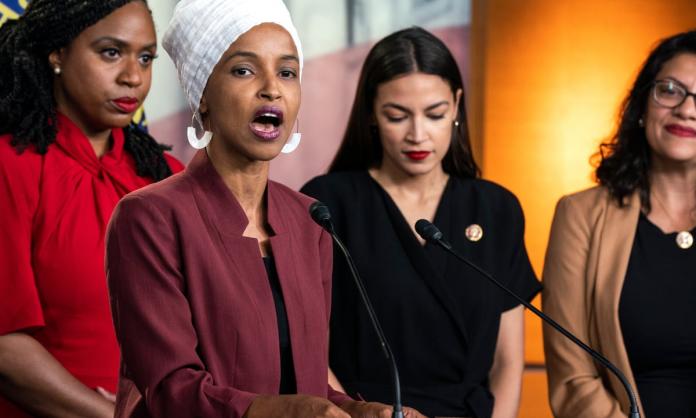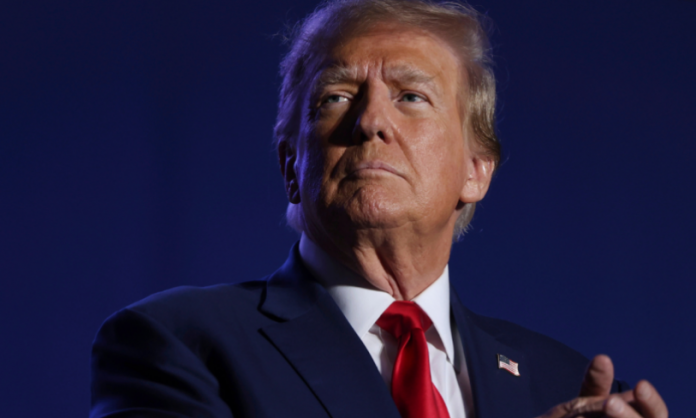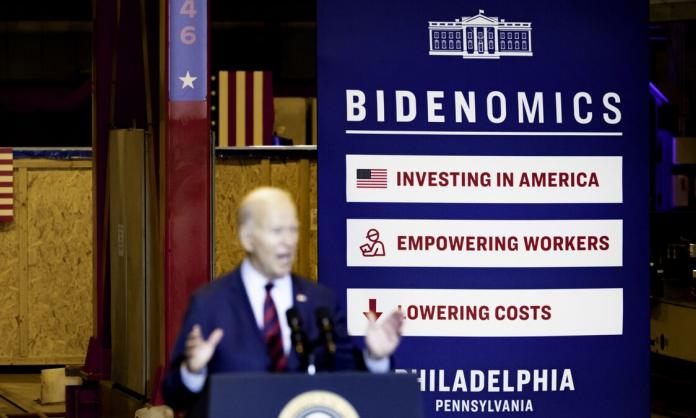Just over a year ago, Bernie Sanders won the Nevada Democratic caucus and became—if you believed the betting markets at the time—the overwhelming favourite to become the Democratic presidential nominee. The liberal media went into instant meltdown. On CNN and MSNBC, incredulous hosts lost their minds. Forgetting all the usual decorum of the liberal rich, they spat out raw class hatred at those ungrateful plebs who had dared to defy their betters by refusing to vote for who they were told to.
For the left, it was a moment of euphoria, and of nervous belief that just maybe, this time, change was really coming. The US leftist website Jacobin led with an article headlined “It’s Bernie’s [Democratic] Party now”.
But soon, the dream would be splattered across the pavement by the Democratic establishment, which proved once again that, however pitifully inept it was at standing up to the Republican Party, it was still a merciless assassin when it came to putting down challengers from its left.
A week after the Nevada caucus, in the final days of the South Carolina campaign, Congressman Jim Clyburn—Democratic Whip in the House of Representatives and controller of the South Carolina party machine—endorsed the seemingly hapless Joe Biden, rocketing him to victory. Days later, on the eve of Super Tuesday, almost the entire field of moderate candidates simultaneously dropped out of the race and endorsed Biden.
The fix was in. At the very last minute the Democratic machine—in a stunning operation almost certainly orchestrated by former-president Barack Obama—moved to crush Sanders and unite behind Biden, a man that until that moment many (including Obama) thought too senile and inept to stand for president.
Biden didn’t sweep the board on Super Tuesday—Sanders still won in several states, including vital ones like California. But Obama’s gambit had worked. The party apparatus had convinced a critical number of voters that whatever their misgivings about Biden, he was the safe bet as a candidate to unite the party and beat Trump. The Sanders campaign wasn’t mathematically wiped out on that day, but politically, it was the knockout blow.
The events that followed Sanders’ eventual defeat had the feel of the aftermath of a Soviet power struggle. First, Bernie bent the knee and endorsed Biden—not reluctantly, or as a lesser evil, but with the full-throated declaration that Biden (his “great friend”) would be one of the great progressive US presidents(!). Then, Sanders capitulated to the cacophony of hysterical reactionaries and agreed to condemn those among his own supporters who stayed loyal to the ethos of his campaign—those poor fools who continued to consider Biden, the corporate Democrat establishment and their Wall Street backers, to be as much their enemy as the cokehead frat boys in the Trump administration.
In March and April, as the pandemic began to spread across the United States, sucking the life out of even those it spared, the left also seemed defeated, bereft. Then, in the wake of the terrible police murder of George Floyd, life returned. Millions of people took to the streets under the banner of Black Lives Matter, a heroic national movement for racial justice the likes of which had not been seen for two generations.
The Sanders-left though, was not stirred. That’s not to say hundreds of thousands, if not millions, of Sanders supporters weren’t there on the streets. But the institutions of the Sanders campaign—the Democratic Socialists of America, the network of pro-Sanders podcasters, online publishers, YouTube broadcasters, campaign spokespeople and organisers—were for the most part lukewarm in their response to this historic uprising.
Why? It was a combination of factors. In some cases, a legitimate critique of the problems of “woke” identity politics led people to disastrously fail to understand or sympathise with a mass uprising simply because it appeared in the form of protest at racial injustice. For others, a myopic focus on elections as the central site of political struggle meant they couldn’t understand the radical potential of the movement.
What these critics missed is that ruptures like Black Lives Matter, events that erupt independently of electoral cycles and political parties and all the institutional politics that control the day to day, are what moves history. These eruptions don’t always lend themselves to movements to the left (think 9/11). Even when they have the potential to, it is not always realised—that is where the institutions on the left that exist and how they react can be decisive. If a new and genuinely radical left is going to be built in the future, it will by seizing these kinds of moments.
There are plenty of criticisms that legitimately can be made of the Bernie Sanders campaigns in 2016 and 2020. A fair number of them have been made here in the pages of Red Flag. But what can’t be denied is that the Sanders presidential campaigns galvanised an extraordinary number of people behind the idea that the status quo is fundamentally flawed, that the major political parties serve the ultra-wealthy, and that we need an alternative that fights for the interests of working-class people.
Bernie Sanders’ idea of socialism was only the faintest echo of what real socialism is about, but he did the US people a historic service by establishing in the minds of millions a vital connection: the world we live in is fundamentally unjust, and socialism is the solution.
The Bernie moment has now passed, for good or ill. The most positive element of his legacy—establishing a left alternative to liberal centrism in the popular imagination—has been achieved. But as the events of last year made brutally clear, that is far short of what is required to challenge the Democratic establishment, let alone the power of US capitalism more broadly.
And the negative legacy of his campaign—entrenching an orientation to transforming the Democratic Party from within, or even, for those who have little faith in the Democrats, framing a strategic approach for radicalism primarily in terms of electoral politics—looms large.
The first weeks of the Biden presidency have been nothing like the early days of the Obama administration. Large swathes of the left either despise Biden or at best distrust him. Liberals might be crooning over Biden policy announcements, but the left—including the left firmly ensconced in the Democratic Party—is much more critical.
In January, there was a lively debate over whether it was right to demand Alexandria Ocasio-Cortez and the so-called squad in the Congress “Force the Vote” by refusing to support Nancy Pelosi as House speaker unless she first agreed to put a vote on Medicare for All legislation to the floor. AOC rejected the idea, which led popular YouTube personality Jimmy Dore to denounce her as a “sell-out” a “liar” and a “coward”. “She is standing between you and health care”, he told his viewers. Dore was backed, if with less colourful language, by a range of Sanders supporters, including his former press secretary and now podcast host Briahna Joy Gray.
Scepticism about AOC and other left Congressional Democrats is to be welcomed. Watching AOC wipe the floor with both Republican bigots and Democrat centrists can’t help but make you wish for even one politician in Australia with a tenth of her charisma and determination to stick it to the status quo. But AOC is much more a creature of the Democratic Party than Sanders was—being an intern for Senator Ted Kennedy in college, for example. The Democratic Socialists, of which she is nominally a member, claims to want to build an alternative to the Democrats. AOC has never entertained such a notion.
She wants to transform the Democrats into a progressive party, or, as she sees it, return it to its pro-working-class FDR roots. As if the most powerful party of capital in the history of the world—and make no mistake that is what the modern Democratic Party is—could ever be a party that champions working-class people in their struggle against the ultra-rich. AOC’s FDR rhetoric is a pitch to the ruling class and the Democratic establishment that mildly redistributive economic policies are not counterposed to the interests of capital, but can in fact serve those interests.
She was viewed as an enfant terrible of the Democrats after defeating senior leader Joe Crowley to become the party nominee and then the congressional representative for New York’s fourteenth district. But within a few short years, and particularly since the defeat of the Sanders campaign, AOC has become one of the party’s superstars. Along with Sanders, she has been one of the most prominent public faces promoting Biden’s economic agenda since he took office. The left Democrats may have been frozen out of cabinet positions in the Biden administration, but they are now the ones making all the running promoting Biden’s agenda.
Nancy Pelosi may still not like her, but AOC is shaping up as a contender for the 2024 presidential race. And you can be sure that if she gets that nomination it will not be because she has somehow defeated the mafia-like Democratic establishment, but because that establishment has accepted her and is confident that she will do its bidding.
If anything defines AOC’s status as a Democratic loyalist—if a critical one—it is her vote for supposed nemesis and arch right-winger Pelosi to be speaker of the House. AOC might say she would not be in the same party as Biden in any other country, but she put up her hand for Pelosi without a moment’s thought.
And that’s the thing about the AOC critics. The “Force the Vote” debate was over the terms on which AOC should have voted for Pelosi as speaker, not whether she should have at all. It was the same with the presidential election debate. Briahna Joy Gray earned herself the hatred of myriad blue-tick Democrats by insisting the left shouldn’t endorse Biden. A good and courageous stand. But her argument was that the left should use the prospect of its endorsement as a bargaining chip to extract concessions from the Biden campaign, and refuse to endorse if he offered nothing to the left—which of course he didn’t.
Gray is a critic of the lesser-evil mentality that dominates US liberalism and has so paralysed the left. But even though she is hostile to Biden, the hostility is still expressed in an electoralist framework: how can we force politicians to be less awful?
The answer is to find ways to pressure existing bad leaders such as Biden, or to get “good” politicians elected—like Sanders or progressive members of Congress. But even if you ignore the enormous conservatising pressure on any genuine left winger elected to the US Congress (let alone the presidency), the effort required to get someone elected necessarily hinges on a framework for politics that prioritises constructing an electoral majority over building an intransigent or clearheaded left.
In the wake of Sanders’ defeat, the most post-mortems focused on the question of what else Sanders could have done to win—neutralising the effectiveness of the party machine, winning over more Black voters, mobilising more young people or workers to vote, and so on. And many of the arguments the left made against the right wing of the Democrats revolved around the idea that Sanders would have had a better chance than Biden to defeat Trump—an argument that was more persuasive before Biden did in fact decisively defeat Trump.
If the left views its road to power as primarily about constructing an electoral majority, it will inevitably abandon its radicalism long before it wins office. Because while it is true that there is an electoral appeal to a Sanders-style left populism, there are also myriad imperatives that push in the other direction. In 2020, the first of those was presenting an alternative to Trump that didn’t seem so hostile to the status quo as to risk losing support from the large sections of capital and the press, who backed Biden against Trump but would never have countenanced Sanders.
If the left is going to build a movement that presents a challenge to the status quo that is profound enough to meet the existential crisis capitalism has plunged humanity into, it can’t start by obsessing about how to win a majority in the gerrymandered world of electoral politics. It has instead to look to the kind of fissures that disrupt the status quo, that point to a radical reimagining of the possible among the mass of the population. And those will happen—as they have throughout history—far outside the electoral sphere.











